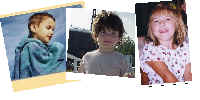Back to
List of HH Kids
Back to
HHUGS Home Page |
|
Christopher and Able

JILL PALMER'S MEDICAL CASEBOOK : FIGHTING FIT; AUSTRALIAN WONDER OP CURES
CHRIS'S EPILEPSY
Copyright 2000 MGN Ltd.The Mirror
November 23, 2000, Thursday
CHRISTOPHER Leslie is free of epilepsy for the first time in his life - thanks to a
pioneering operation in Australia. Surgeons used a unique method to successfully remove a
tumour from deep inside 10-year-old Christopher's brain which was causing the fits. Now,
just six weeks after the remarkable surgery, Christopher is back home in London and free
of the epileptic seizures that had dominated his life.
"I know it is a cliche, but this really is a miracle," says his father Aidan.
"The difference in Christopher is amazing. He is doing really well. Until this
operation Christopher was going backwards. He was having increasing numbers of fits, his
learning difficulties were worsening, and he would have ended up needing constant care.
Now he is starting to go forwards. He no longer has seizures and his communication skills
are developing already."
Christopher was born with a rare form of epilepsy known as gelastic epilepsy which causes
seizures combined with involuntary and fearful uncontrollable bouts of laughing. It is
caused by a brain tumour called a hypothalamic harmartoma. From birth, Christopher
suffered fits, making strange giggling noises followed by stiffening of his arms and legs.
The condition was diagnosed when he was 10 months old after a series of tests and scans.
For the next five years drugs controlled the fits, but after working well at first
Christopher gradually became resistant to the medication. Different combinations of drugs
were tried unsuccessfully. He began to suffer increasing numbers of seizures when he would
laugh and make strange sounds before his body stiffened and jerked uncontrollably and he
fell unconscious to the floor.
In the past two years his condition deteriorated dramatically with more frequent and
severe fits. Christopher was suffering up to 300 a day, often injuring himself when he
collapsed, and needing long periods of sleep afterwards to recover. These continual
seizures damaged his brain and had a detrimental effect on his developmental progress,
learning ability and behaviour. Surgery to remove the tumour seemed the only answer. But
Aidan and wife Amanda, both 35, were told it was too risky to operate on Christopher
because of the position of the tumour. The couple, who have two other children Sarah,
eight, and six-year-old Daniel were dismayed. But they refused to give up hope.
In desperation Aidan searched the internet and learned about the unique techniques being
used by Prof Jeffrey Rosenfeld in Melbourne, Australia. Only three hospitals in world - in
Paris, London, and Melbourne - have experience in operating on Christopher's condition.
But the Maudsley Hospital in South London and the hospital in Paris have low success rates
compared with the Royal Children's Hospital in Melbourne.
"Because the condition is so rare, information and contact with other families is
difficult to find," said Aidan. "I searched the internet and finally discovered
a group of families worldwide which was started nearly three years ago and has 60 members.
It was wonderful to speak with other people who were going through a lot of the
difficulties we faced each day. And through this group I discovered the new surgical
technique being done in Australia where surgeon had operated and successfully removed this
type of tumour and the children had been seizure free since."
Aidan immediately contacted Prof Rosenfeld, who after seeing Christopher's scans, x-rays,
and medical notes, agreed to operate. Last month, after raising the necessary pounds
25,000, Christopher and his parents flew to Australia leaving their younger children with
grandparents.
"It was a very dangerous operation and there were potential complications," said
Aidan of Queen's Park, West London. "But it was Christopher's only chance. Thankfully
he came through it without any problems. Prof Rosenfeld told us he has removed between 97
and 100 per cent of the tumour, but we will have to wait a few months until the swelling
inside the brain goes down before he can be certain.
"We were warned Christopher would suffer post-operative seizures but once these
stopped he has not had a single one. He is already speaking and thinking more clearly. We
hope he will be back at school next term and regain all the knowledge that he missed out
on. We have longed for this day when Chris no longer has to go through another seizure and
his laughter is no longer a matter of fear, distress and the cause of so much disruption
in his life."
PROF Rosenfeld uses a revolutionary technique to remove the tumour which involves entering
the brain from above rather than below. So far he and his team have operated on 12
children and all are free of disabling seizures although two have infrequent mild staring
spells.
Dr Simon Harvey, director of the Melbourne hospital's children's epilepsy programme
said: "Our surgeons use the transcallosal technique which involves operating from the
top of the brain rather than below.
"It is safer than the operation performed in the UK where they access from lower in
the skull. Such operations are more hazardous because of the need to operate close to
vital structures such as nerves and blood vessels. In our approach these nerves and arteries are not encountered although there are other
risks which include disturbance of memory and hormone balance."
|

